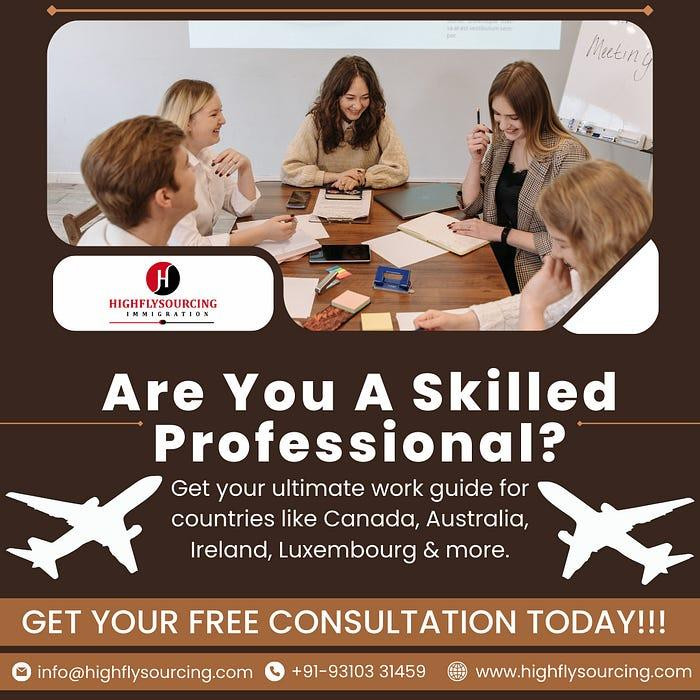Global mobility is no longer reserved for diplomats or multinational CEOs. Today, professionals in IT, healthcare, engineering, education, and creative industries are taking their skills worldwide. But with this opportunity comes complexity — especially when it comes to securing a work permit in a foreign country. The reality is: immigration rules are not just complicated; they’re also dynamic.
Whether you’re relocating for a job, starting a business, or expanding your career horizon, understanding how to legally work in another country is critical. Here’s how you can take the guesswork out of the process — and why partnering with a visa immigration consultancy could save you time, money, and frustration.
1. Know the Type of Work Permit You Need
Different countries offer various types of work permits depending on your purpose and qualifications:
- Skilled Worker Visas (e.g., Canada’s Express Entry, UK’s Skilled Worker visa)
- Intra-Company Transfer Visas (e.g., L1 Visa for the US)
- Freelance/Digital Nomad Visas (e.g., Estonia, Portugal)
- Working Holiday Visas (e.g., Australia, New Zealand for young adults)
Real-world example: A software engineer from India applying to work in Germany will likely need a Blue Card, which requires proof of a high-salary job offer and a recognized degree.
2. Understand Processing Times and Deadlines
Visa processing times vary widely based on country, visa type, and even seasonal demand. Missing a deadline could mean losing your job offer or delaying your start date.
Key tip: Always include buffer time for document collection, translations, legalization, and unexpected delays.
Example: UAE employment visas can take just a few days, while US H-1B visas may take several months due to lottery systems and quota limits.
3. Master the Documentation Maze
Most work permit applications require dozens of supporting documents. These may include:
- Degree certificates and transcripts
- Reference letters from previous employers
- Passport-size photographs (with strict specifications)
- Language test results (e.g., IELTS, TOEFL, TEF)
- Criminal background checks
- Health insurance or medical reports
Even a small oversight — like submitting an outdated passport — can cause rejection.
Pro tip: Create a digital folder with scanned copies of all required documents. Label everything clearly and back it up.
4. Understand Work Rights and Limitations
Many applicants mistakenly assume that all work visas offer the same freedoms. Some permits are employer-specific, meaning you can’t change jobs freely. Others may restrict the number of hours you can work or prohibit bringing dependents.
Consultancy benefit: Visa experts can explain your exact rights, so you don’t unintentionally violate immigration law.
5. Keep Up with Changing Policies
Immigration policies are influenced by political and economic conditions. For example:
- Canada updates its occupation shortage list regularly.
- Brexit reshaped work permit eligibility for EU citizens in the UK.
- The U.S. often updates the annual H-1B cap and priority categories.
Best practice: Don’t rely on outdated blogs or forums — regulations may have changed. Instead, get advice from certified consultants or official sources.
The Value of a Visa Immigration Consultancy
Here’s a closer look at how immigration consultancies support your journey:
Tailored Advice and Strategy
Not all visa options are obvious. A good consultant will evaluate your personal situation and match you with the best pathway — even helping you consider secondary options or lesser-known visa types.
Example: You may think you need a work visa, but your profile might qualify for a residency permit under a talent or investment program.
Error-Free Application Management
Consultants ensure your paperwork is flawless, improving your approval chances. They’ll help you avoid:
- Incomplete application forms
- Inconsistent information
- Missing documentation
- Formatting or translation issues
End-to-End Support
From preparing for embassy interviews to submitting appeals in case of rejection, experienced consultants provide full-cycle services.
Insider Knowledge
Agencies often know what case officers look for and what red flags to avoid. They may also be able to fast-track applications through business networks or professional associations.
Choosing the Right Immigration Consultancy
Not all consultancies are created equal. Here’s what to look for:
- Licensing and Accreditation: Are they recognized by the country’s immigration authority? (e.g., ICCRC in Canada, OISC in the UK)
- Client Testimonials: Do they have a track record of success?
- Transparency: Are their fees clear with no hidden charges?
- Specialization: Do they specialize in work permits or offer general services?
Conclusion
Moving abroad for work is a life-changing experience — but also one filled with uncertainty. Between bureaucracy, deadlines, and legal jargon, it’s easy to feel overwhelmed. By educating yourself on the work permit process and working with a reliable immigration consultant, you put yourself in the best position to succeed.
Whether you’re a professional, entrepreneur, or employer relocating staff, the right support can turn a daunting process into a smooth transition.
Ready to take the next step? Reach out to a trusted visa consultancy to discuss your options and start building your global future today.
For more information or to schedule a consultation with Highfly Sourcing, visit their website or contact them directly on mail info@highflysourcing.com your global adventure awaits, and with the right support, you’ll be ready to embark on it with ease.
Other Links


